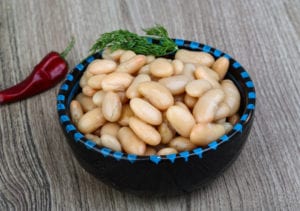Written by Greg Arnold, DC, CSCS. This study demonstrates that, for supporting longevity, legumes may be the most important component in the Greek variant of the Mediterranean Diet.
 Since the 1960’s, research has consistently pointed to the Mediterranean Diet (1,2) as the most beneficial for maintaining health and minimizing overall disease risk (3, 4). The Mediterranean Diet has a few variants, one of which is a “Greek variant” and is characterized by:
Since the 1960’s, research has consistently pointed to the Mediterranean Diet (1,2) as the most beneficial for maintaining health and minimizing overall disease risk (3, 4). The Mediterranean Diet has a few variants, one of which is a “Greek variant” and is characterized by:
- Consumption of plenty of fruits, vegetables, legumes, and grains, with olive oil as the main fat
- Limited consumption of lean red meat — only a few times per month or in very small portions
- Low to moderate daily consumption of dairy, poultry, fish, and eggs
- Consumption of wine a couple of times per week (5).
But when suggesting which food component in the Greek variant of the Mediterranean Diet should have a priority, a new study (6) suggests legumes may be the most important for longevity. In the study, researchers analyzed food intake in 785 subjects living in Japan, Sweden, Greece, and Australia between 1988 and 1991, over the age of 70 in the “Food Habits in Later Life” (FHILL) study (7) and who were followed for 7 years. The researchers analyzed nine major food groups that included vegetables, legumes, fruits and nuts, milk and dairy products, cereals and potatoes, meat and meat products, ethanol, monounsaturated to saturated fats ratio, and fish groups.
Out of the 785 participants in the baseline, 169 people died during the follow-up period. The researchers found only legumes to provide a decreased risk of death (“reduction in mortality”) across the different cohorts of the study. Specifically, every 20-gram increase in legume consumption produced a 7-8% reduction in mortality with or without controlling for ethnicity (p = 0.02), while “other food groups were not found to be consistently significant in predicting survival amongst the FHILL cohorts”, including vegetable (p = 0.70), fruit and nut (p = 0.38), cereal (p = 0.78), dairy (p = 0.28), meat (p = 0.42), and fish intake (p = 0.20).
When looking at legumes, the researchers cited the soy, tofu, natto, and miso consumption among the Japanese (8), brown bean and pea consumption among the Swedes (9), and lentils, chickpeas and white bean consumption in the Mediterranean (10). They went on to conclude that “The FHILL longitudinal study shows that a higher legume intake is the most protective dietary predictor of survival amongst the elderly, regardless of their ethnicity.”
Source: Darmadi-Blackberry et al 2014.Legumes: the most important dietary predictor of survival in older people of different ethnicities. Asia Pacific J Clin Nutr 2004;13 (2):217-220
Click here to read the full text study.
Posted June 8, 2016.
Greg Arnold is a Chiropractic Physician practicing in Hauppauge, NY. You can contact Dr. Arnold directly by emailing him at PitchingDoc@msn.com or visiting his web site at www.PitchingDoc.com.
References:
- Trichopoulou A, Katsouyanni K, Gnardellis C. The traditional Greek diet. Eur J Clin Nutr 1993; 47 (Suppl 1): S76-81
- Trichopoulou A, Vasilopoulou E. Mediterranean diet and longevity. Br J Nutr 2000; 84 (Suppl 2): S205-9.
- Kromhout D, Keys A, Aravanis C, Buzina R, Fidanza F, Giampaoli S, Jansen A, Menotti A, Nedeljkovic S, Pekkarinen M. Food consumption patterns in the 1960s in seven countries. Am J Clin Nutr 1989;49 (5):889-94.
- Willett WC. Diet and health: what should we eat? Science 1994; 264 (5158): 532-7.
- Keys A. Mediterranean diet and public health: personal reflections. Am J Clin Nutr 1995; 61 (6 Suppl): 1321S- 1323S
- Darmadi-Blackberry I Legumes: the most important dietary predictor of survival in older people of different ethnicities. Asia Pac J Clin Nutr. 2004;13(2):217-20
- Wahlqvist ML, Hsu-Hage BH, Kouris-Blazos A, Lukito W, IUNS Study Investigators. Food Habits in Later Life: A cross-cultural study. Asia Pac J Clin Nutr and United Nations University Press, CD-rom, 1995
- Hosking R. A dictionary of Japanese food. Tokyo: Charles E Tuttle Inc; 1997.
- A small treasury of Swedish food: The Swedish Dairies Association and The Swedish Farmers Meat Marketing Association; 1977
- Trichopoulou A, Lagiou P. Healthy traditional Mediterranean diet: an expression of culture, history, and lifestyle. Nutrition Reviews 1997; 55 (11 Pt 1): 383-9.
